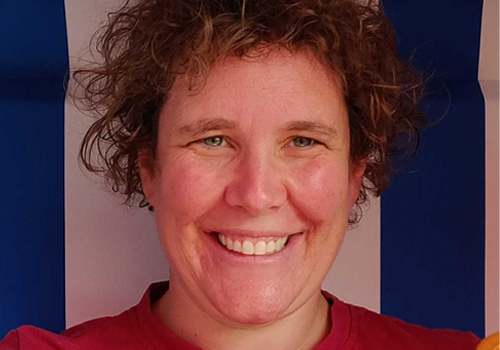A research study by The National Center for Women & Information Technology showed that “gender diversity has specific benefits in technology settings,” which could explain why tech companies have started to invest in initiatives that aim to boost the number of female applicants, recruit them in a more effective way, retain them for longer, and give them the opportunity to advance. But is it enough?
Four years ago, we launched a diversity series aimed at bringing the most inspirational and powerful women in the tech scene to your attention. Today, we’d like you to meet Agata Nowakowska, Area Vice President EMEA at Skillsoft.
Today’s Woman in Tech: Agata Nowakowska, Area Vice President EMEA at Skillsoft
 Agata Nowakowska is Area Vice President EMEA at Skillsoft, where she leads the field operations, to include enterprise and small & mid-market, as well as channel sales/strategic alliances across Europe, Middle East and Africa.
Agata Nowakowska is Area Vice President EMEA at Skillsoft, where she leads the field operations, to include enterprise and small & mid-market, as well as channel sales/strategic alliances across Europe, Middle East and Africa.
When did you become interested in technology? What first got you interested in tech?
I have to be honest and say it was actually an accident. At the end of the nineties, tech talent was as it is now, scarce. I was young, looking for a new opportunity and saw a job advert that attracted my attention. It was for a well-known hardware company in the Netherlands looking for an International Sales Manager. I was ambitious, eager to learn, and felt confident that I could do the job and learn as I go. And, while it appeared a little easier than it turned out to be, that’s how I got my start in the technology space.
Let’s talk about your background. How did you end up in your career path? What obstacles did you have to overcome?
I am a Polish female. However, I started my career in the Netherlands and then five years ago I moved to the UK. In my first technology role I felt a desperate need to prove my value to myself and others, working what felt like harder than anybody else at that time. It was over 20 years ago, and the tech sector was extremely male-dominated. I was the only female in a similar role in the company. However, while there were differences between myself and my male co-workers, such as in pay parity, at that stage I didn’t care so much. All I wanted was an opportunity to prove myself first.
Did you receive support from your family and friends? Do you have a role model?
I left Poland when I was about 20. Regardless of the fact that my friends and family were about 1500 kilometres away, they continued to support me as I started my new chapter. My mum is my role model, and while her positivity, faith and supportive comments would challenge me slightly when I was younger, they have always been extremely helpful. She is a great supporter and advocate, who taught me to believe in myself, never to give up, and to be strong; advice I now instil in my own 15-year-old daughter.
After all these years, my mum continues to support me, as does my husband. In fact, without his support it would be very difficult as a full-time working mother. As female workers, we want to be a perfect colleague, mother and wife. However, combining all these values is hard. My husband has helped me through every single step. Whatever we have been able to accomplish, it’s been as a team.
Did anyone ever try to stop you from learning and advancing in your professional life?
When I first saw the job advert for the hardware company that ended up being my first foray into tech, I decided to give their HR Director a call and ask some questions before I formally applied. He was very polite but after a few minutes of learning about my background and lack of experience in the sector, he recommended I don’t bother to apply. I still did. It was a complex and lengthy process, but I got the job and it was not only an amazing learning opportunity, but a true game changer in my career.
Other than this example, nobody’s ever tried to limit me from advancing in my career, for that I’ve been lucky. But for any woman that does experience setbacks such as this, I urge: never give up, always follow your dreams.
A day in Agata’s life
 I work for a digital learning company, Skillsoft, in the role of Area Vice President EMEA. I lead a number of customer-facing sales teams, helping organisations prepare the workforce of today with the skills of tomorrow. At Skillsoft we believe that every worker has the potential to be amazing, and have inclusive learning options for all. We enable IT teams to develop skills and achieve certifications, and help organisations develop leaders, stay safe and follow regulations. I love the business I am in, and Skillsoft specifically, it energises and inspires me every single day.
I work for a digital learning company, Skillsoft, in the role of Area Vice President EMEA. I lead a number of customer-facing sales teams, helping organisations prepare the workforce of today with the skills of tomorrow. At Skillsoft we believe that every worker has the potential to be amazing, and have inclusive learning options for all. We enable IT teams to develop skills and achieve certifications, and help organisations develop leaders, stay safe and follow regulations. I love the business I am in, and Skillsoft specifically, it energises and inspires me every single day.
My days are varied, and normally involve planning ahead, not only just for tomorrow or the next week, but months, sometimes years in advance. I also conduct team meetings, performance reviews and customer-facing engagements, which is something I really enjoy doing as much as possible. I used to travel quite a lot for work, but that has changed with the ‘new normal’ we all face.
What we need to do is better advertise the opportunities for female workers in the sector: Speaking clearly and loudly about the benefits, and offering opportunities for women to develop and train.
What are you most proud of in your career?
I am proud of the Skillsoft EMEA team and how much we’ve managed to grow and accomplish together. There is an extremely collaborative culture at Skillsoft which continues to inspire me: A ‘one team approach.’ I am proud about the culture that we have created in the region, and I know it’s something the whole team appreciates.
Secondly, I am proud of the many customers that the team have continued to support and the amazing learning initiatives that we work on. Seeing our customers succeed against their business expectations and sometimes winning industry awards based on their work with us, is all too inspiring.
Why aren’t there more women in tech? What’s your take on that?
Nowadays, every company is a technology company. Every company’s success depends on its ability to execute digitally and continue to invest in technology-driven offerings and opportunities. With skills gaps increasing further as a result of the pandemic, filling technology roles has become a critical issue for organisations, presenting a huge opportunity for female workers. However, while the percentage of women in tech continues to increase, this is happening at a very slow rate. In the last fifty years, for example, the percentage of female workers in the industry grew only from around 7 percent to 27 percent.
What we need to do is better advertise the opportunities for female workers in the sector: Speaking clearly and loudly about the benefits, and offering opportunities for women to develop and train. These issues should be structuring solutions that will empower women in tech and promote Diversity, Equity and Inclusion (DEI).
Could you name a few challenges (or obstacles) women in tech face?
Biases and stereotypes fuel the challenges that women in tech continue to face. This starts with primary and secondary education, with the learning opportunities offered at school, as well as marketing and awareness across the young generation about what it means to work in tech and the opportunities it may serve.
Then, once women enter the technology workforce, the three main obstacles they face are equal pay, work/life balance and a lack of professional development opportunities. While work/life balance is hopefully improving as more employers embrace remote and flexible working, development opportunities continue to be lacking for women in tech. In fact, 38 percent of women in the sector cite a lack of training opportunities as the main thing troubling them, while 32 percent name unequal pay (32%). And, it’s not just Tech & Dev certifications that women want, but softer skills such as emotional intelligence and strategic thinking, which are crucial for their development.
How would our world be different if more women worked in STEM? What would be the (social, economic, and cultural) impact?
Aside from a diverse workforce being the right thing to do, it’s also the smart thing to do. According to McKinsey, the more diverse the workforce is, the more likely the organisation is to outperform its peers by 25 percent. Then if you also include ethnic and cultural diversity amongst executives – this rises to 35 percent. Diversity is a proven asset across key performance factors, such as brand image and customer, shareholder and employee satisfaction. We have to acknowledge that and encourage DEI in the workforce.
Furthermore, currently 76 percent of global IT decision makers are dealing with critical skills gaps on their teams. Technology companies have a real opportunity to fill these talent gaps by opening up the talent pool to more women. Promoting valuable benefits, shouting about the learning and development opportunities on offer, and offering coaching and mentoring, will all be important for attracting female talent. Women want the opportunity to better themselves and often the biggest challenge blocking them is their confidence, so organisations should focus on nurturing talent.
Aside from a diverse workforce being the right thing to do, it’s also the smart thing to do.
The discussion about diversity is gaining momentum. How long will it take to see results from the current discussion?
It’s hard to quantify, but the quicker we speak about diversity and implement action, the sooner we will see results. Covid, of course, impacted some of this. At Skillsoft, we coined the phrase the ‘Pink Pandemic’ to explore how Covid-19 disproportionately affected women across all facets of their lives, both personal and professional. On the other hand, the average salary for female workers in tech continues to increase. And, strategic initiatives, such as Skillsoft’s latest partnership with iamtheCODE, are inspiring the next generation of women to learn tech skills – with a goal of enabling 1 million young women and girls to code by 2030.
‘But how long will it take to change the world’, you ask? I wish I knew the answer to that question.
What advice (and tips) would you give to women who want a tech career? What should they know about this industry?
Technology is ever-growing, it’s a very attractive sector that has huge growth potential for everybody. In fact, job satisfaction and security is higher than a lot of other industries. Skillsoft’s 2021 Women in Tech Report found 91 percent of respondents were extremely or somewhat satisfied in their roles. The key drivers of job satisfaction currently are pay, benefits, work-life balance and job potential. So clearly, across these categories, we must be doing something right!
My advice to women who want a tech career is to continue to develop, continue to learn. Certifications matter. The greater the qualification, the greater the opportunity. However, don’t only focus on tech, develop additional skills that help better yourself, such as leadership, emotional intelligence and strategic thinking. Most importantly, believe in yourself. Don’t get discouraged, stay strong and never give up. Just keep going!
More Women in Tech:
- Women in Tech: Elise Morse, Vibration Analyst at Augury
- Women in Tech: Hamida Rebaï Trabelsi, Senior Cloud Application Architect at Revenu Quebec
- Women in Tech: Chelsea Hohmann, Engineering Manager at Stoplight
- Women in Tech: Bailey Hayes, Principal Software Engineer at SingleStore
- Women in Tech: Jennifer Reif, Developer Relations Engineer at Neo4j
For even more Women in Tech, click here
The post Women in Tech: “Continue to develop, continue to learn” appeared first on JAXenter.
Source : JAXenter















